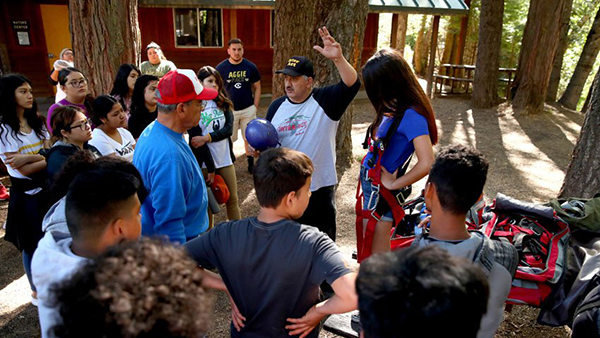Inter-Act partners with county offices of education, migrant education and institutions to provide outdoor educational experiences to migrant and foster youth who would not otherwise have access to such summer camp.
As Jose Lomeli steps off the Greyhound bus, he feels the chill of the Lake Tahoe air hitting his face. It’s the winter of 1978 and Lomeli, a 20-year-old migrant student from Modesto Junior College, is surrounded by a group of soon-to-be teachers preparing for a five-day outdoor wilderness adventure with California Mini Corps.
He is immediately in survival mode. Along with a group of people he just met, he must survive in the mountains with only the equipment on his back. Lomeli quickly learns trust is key. He must rely on the strengths of the people around him to make it through this intimidating experience. As trust goes both ways, his peers had to rely on him to cook for the group.
Cooking was something his mother had always done. When Lomeli was a boy, she would wake up at 3 a.m. to prepare homemade tortillas and sopes for her husband and four sons along with packing each of them a day’s worth of food so they were ready by 5 a.m. to work in the fields.
Though Lomeli had learned from his mother, he felt the pressure of cooking outdoors for such a large number of people. But he learned to face his fears and discovered he enjoyed trying something new.
This was Lomeli’s first outdoor educational experience — and he was hooked.
During the week, he hiked, built shelters, navigated with a compass and rappelled off a 200-foot cliff. He connected immediately with Augie Perez, at the time a program facilitator for California Mini Corps and faculty at UC Berkeley and UC Davis. Perez taught Lomeli that outdoor education is impactful for its participants and is a teaching tool that can utilize nature to help people overcome challenges.
Fast forward 30 years, Lomeli, now a Fresno State professor, and Perez, UC professor emeritus, have been running outdoor educational experiences for migrant children almost every month.
Together they created Inter-Act, an organization that partners with county offices of education, migrant education and institutions to provide outdoor educational experiences to migrant and foster youth who would not otherwise have access to such summer camps.
“Myself and colleagues found that for migratory families, sending their children away for a week to summer camp was a foreign experience. We dealt with resistance. Migrant parents would often say, ‘Why should we send our children to outdoor camps? We live and work in the outdoors all day long. We want our children to wear ties and work in offices with air conditioning.’”
Visit Fresno State Magazine to read more.
|


